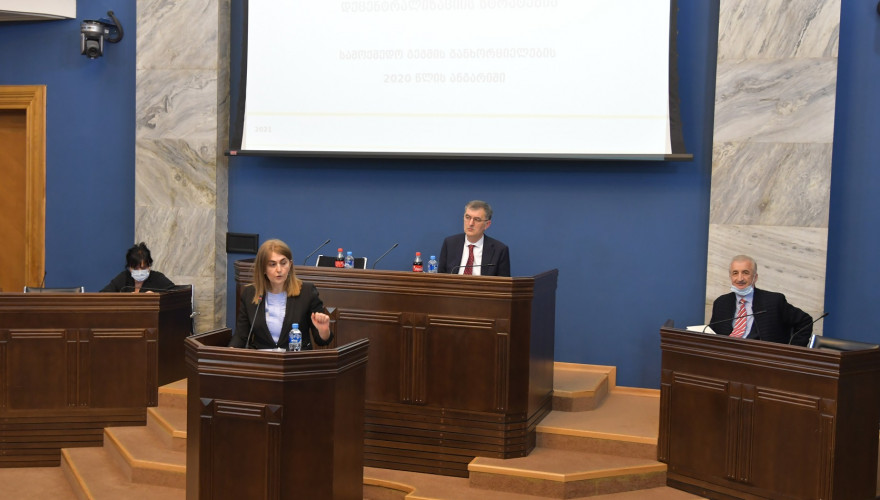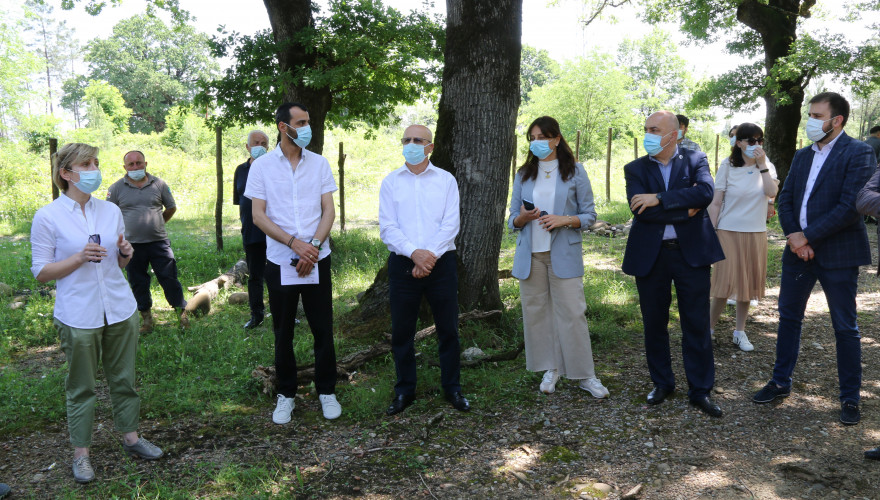Regional Policy and Self-Government Committee Hearing Implementation Report of Decentralization Strategy Action Plan 2020-2021

The Committee, presided by the Chair Sozar Subari, heard the report on implementation of the Decentralization Strategy Action Plan for 2020-2021, which was introduced by the Deputy Minister of Infrastructure, Mzia Giorgobiani.
"One of the steps taken in this regard is the Code of Self-Government adopted in 2014, and in this regard, we can say that the basic framework for our development, goals and directions has already been adopted and now it is paramount to fully address the objectives related to increasing municipal powers, financial strengthening, enhancement the role of municipalities in encouraging the local economy, deepening inter-municipal cooperation, further raising the qualifications of local public servants, etc.”, - the Deputy Minister stated and outlined the three main areas on which the actions needed to implement decentralization in general should be built:
- Increasing the role of the self-governing unit in resolving a significant part of public affairs;
- Providing local self-government with appropriate material and financial resources;
- Establishing credible, accountable, transparent and result-oriented local self-government.
Together with the state structures and organizations, the Regional Policy and Self-Government Committee also participated in the inter-agency commission set up to develop a decentralization strategy and action plan.
"The result of the implementation of the strategy, which we must achieve by 2025, is that the share of total revenues of local governments in GDP should be at least 7% and property that will not be registered in the territory of municipalities should be automatically transferred to the ownership of municipalities. This is a cornerstone that is really important for building wealth on the ground in the municipality and strengthening the existing system", - the rapporteur stated.
According to the Deputy Minister, the Action Plan 2020-2021 for the Implementation of the Decentralization Strategy 2020-2025 includes 3 goals, 8 tasks, 26 activities and 46 performance indicators. According to her, among the activities carried out in 2020, it is noteworthy that 171 legislative changes have been adopted to harmonize the legislation, an electronic information flow management system has been introduced in 21 municipalities, more than 3,000 local government officials have been trained, three draft legislative initiatives have been prepared, etc.
The co-rapporteur, Nikoloz Rosebashvili, Head of the Department of Local Self-Government Development and Policy of MRDI, made a presentation on the activities carried out in 2020, spoke in detail about the actions envisaged in the Action Plan, which have been implemented in the municipalities so far.
Then the meeting resumed in question-answer mode.
Finally, the Committee took note of the report and recommended the Ministry of Regional Development and Infrastructure to submit a detailed written activity report to the Committee.
Today, the Committee also deliberated the Bill on Entrepreneurs together with the accompanying drafts by MPs Mikheil Sarjveladze, Ana Buchukuri, Tea Tsulukiani, Shalva Papuashvili, David Songhulashvili, Maka Bochorishvili, David Matikashvili, Aluda Ghudushauri, Mikheil Daushvili and Beka Liluashvili.
Mikheil Sarjveladze introduced the general principles of the bill.
According to the rapporteur, the current Law on Entrepreneurs was adopted in 1994, and although the existing wording has undergone a number of changes, this document still does not fully meet the set goals, as a number of issues remain unresolved.
For this purpose, the Bill on Entrepreneurs (consisting of Article 256 and Chapter XVI) was prepared, which, according to the rapporteur, strengthens the role and purpose of law in entrepreneurial relations, improves the legal framework, better regulates internal corporate relations and promotes entrepreneurial freedom. The bill also addresses issues related to conflicts of interest, obligation of good faith, expulsion of a partner from the entrepreneurial community, reorganization and liquidation of the company, and other important innovations and changes.
Due to the content of the draft law, it is necessary to amend the Local Self-Government Code so that the liquidation rule of an enterprise whose at least 50% shares or stocks are owned by the municipality does not remain outside the regulation.
According to the law, the amendment extends to 23 laws and 2 organic laws. The enactment of the new Law on Entrepreneurs, due to its scope and importance, requires proper training of both public institutions and entrepreneurs. With this in mind, the enactment of the draft law is scheduled for November 1, 2021.
After giving the questions to the speaker, the Committee approved the document to the Plenary.
The Committee considered the legislative proposal submitted by the citizens of Georgia: Zaza Meishvili, Marina Meskhi, Alika Kuprava, Giorgi Mumladze and Giorgi Chipchiuri on the draft organic law on Local Self-Government Code of Georgia. The legislative proposal was rejected on the grounds of non-compliance with the current legislation.





